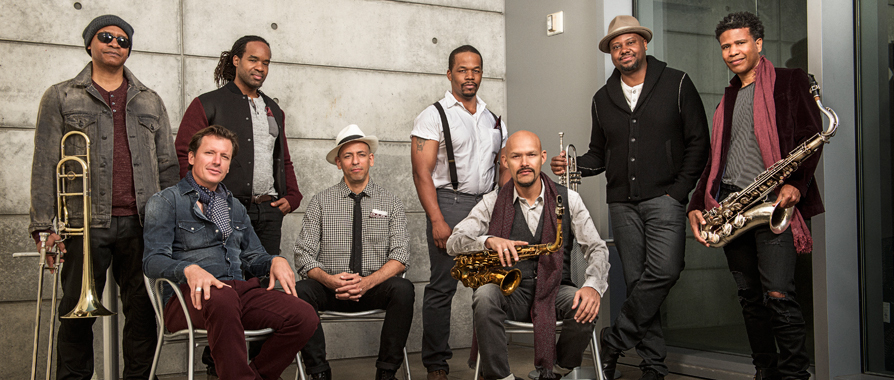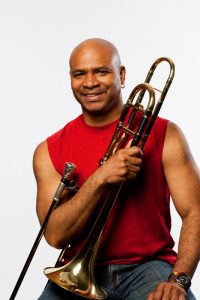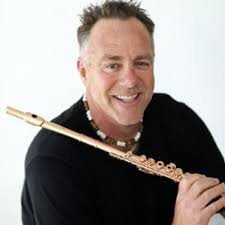Miles Revisited

SFJAZZ Collective; photo used by permission of La Jolla Athenaeum
Athenaeum Jazz at TSRI’s latest presentation of the SFJAZZ Collective on Saturday, October 8, was remarkable for its a high degree of virtuosity, exciting new arrangements, and distinctive original compositions. The theme of the evening was the music of Miles Davis and yet, unlike the great trumpet player’s bands, a certain ponderousness prevailed, attributable perhaps, to the absence of strong, central leadership in this leaderless band of band leaders.
Opening with tenor saxophonist David Sánchez’s abstracted arrangement of Miles’ original “Teo” (dedicated to the famed

David Sánchez; used by permission of the artist
producer Teo Macero), the work held onto its original modal properties. Sánchez chose to exploit these through an updated and contemporary harmonic treatment. Moving from the tenor sax to the barríl (a drum from Curaçao), the music flowed effortlessly into an almost Santería styled rhythmic embrace. Textures deeply redolent of Afro-Caribbean spiritual practice abounded within this atmosphere of an extra-musical rite. Exiting the section through extremely tight ensemble work featuring the horns of alto saxophonist Miguel Zeñon, trumpet player Sean Jones and trombonist Robin Eubanks as well along with the rest of the band, Sánchez’s arrangement was an original and fresh retake on the Miles Davis original.
Bassist Matt Penman’s reworking of “Milestones” unleashed the eight hyper-virtuosos in a deft “little big band” arrangement. Here, the voicings of the four horns emulated a larger, more traditional fourteen piece horn section in a compact context. The lack of a distinct leader showed its face in myriad ways: on the one hand, each of the musicians was able to take very personal ownership of their own parts as well as the band’s sound and repertoire; on the other hand, there was no clear, unified esthetic throughout the program. Each work, “Milestones” among them, came across as sui-generis. Not a bad quality, but a little disconcerting for the listener who perhaps came expecting a more cohesively expressed sonic vision.
Pianist Edward Simon presented the first original of the night, entitled “Feel the Groove.” Beginning on shakeré along with Sánchez on the barríl, the two again produced that expressly spiritual, quasi Santería vibe giving altoist Zeñon an opportunity to stretch out in a modal groove, exploiting his impressive altissimo facility. Throughout the entire piece, drummer Obed Calvaire held down an extraordinarily complex drum pattern that incorporated the Caribbean 6/8 feel of the hand percussion along with the rest of the band’s Latin 4/4. A deeply Reichian interlude (“Drumming”, anyone?) eventually broke down into a Penman bass duet with Calvaire, ending the broad shouldered tune wispily.
Throughout the evening, trumpeter Jones was cast in the role of the Prince of Darkness (one of Miles’ nicknames), wisely choosing not to imitate the late giant through specific gestures, riffs or sonic idiosyncrasies. Wolf’s arrangement of Miles’ “Joshua” provided for on opening solo by Wolf, but as in the “great” Miles Davis Quintet of the 1960’s, much of the creative heavy lifting was subsequently left to the able colleagues. Sánchez’s subsequently clear and driving tenor solo demonstrated a fully mature and unique jazz voice. Simon next channeled a Herbie Hancock inspired solo, taking the MJQ’s pianist’s harmonic, rhythmic and phrasing creations from the 1960’s into present day parlance. He fluently demonstrated his deep familiarity with Hancock’s work from the 1960s, as well as with all that has transpired since in the world of jazz pianism. Finally, we were treated to a fascinating display by drummer Calvaire, soloing over Penman’s ostinato bass to great effect. The piece sounded less like an arrangement than an impressive new gem from Miles’ massive cannon.

Robin Eubanks: photo used by permission of the artist
Trombonist Robin Eubanks’ original “Shields Green” is based upon the history of the fugitive slave by the same name who died in John Brown’s 1859 raid on Harpers Ferry, as recounted by Frederick Douglass. Opening with Jones on Harmon-muted trumpet over an electric piano keyboard patch brought to mind Miles’ groups of the “Bitches Brew” era. Following the statement of the head, horn players Sánchez, Zeñon and Jones along with vibraphonist Warren Wolf launched into blistering fours, where each instrumentalist played four measures of solo in a round-robin. The ensuing denouement of highly contrapuntal horn lines ended the tune with breathtakingly tight passage-work.
Drummer Calvaire was thankfully given the next composer’s spotlight. His “111” opened in ¾ with a non-waltz that quickly acquired polymetric proportions by the now-familiar superimposition of a 4/4 aspect. Jones, this time featured on the flugelhorn, offered up a lusciously consistent sound throughout his entire range. The rhythmic mastery of the whole ensemble was presented for all to hear as Calvaire held down an astonishingly complex 4/4 drum pattern in the face of the piano and bass’s insistent ¾.
Zeñon’s arrangement of Miles’ “Nardis,” perhaps the most familiar piece of the evening, gave him an opportunity to again show both his virtuosic alto skills as well as his deep fluency as an arranger. On the heels of the familiar head played by trombonist Eubanks, Zeñon launched into a blistering solo duet with vibraphonist Wolf. To conclude the tune, we were witness to an outrageously creative drum solo by Calvaire that left the entire house breathless.
Following “Nardis,” the last scheduled piece on the program, the group returned to the stage for an encore. “Canto,” by Sánchez had Zeñon move to the barríl over an ostinato bass. Sánchez’s solo clearly echoed Wayne Shorter in its choice of timbres, spaciousness and ritualistic unfolding. The fluent harmonic horn arranging brought to mind the classic Miles Davis Quintet in its moving simplicity and “downtempo” style.
The question remains how the troupe’s creative output would have been affected by the presence of strong, consistent and specific leadership. Clearly, democracy has its limitations and problems, as this election is showing us. Nonetheless, I have yet to meet anyone, musician or not, who would trade his or her voice for the single voice of a dictator.

Yochanan Sebastian Winston, Ph.D. has performed throughout the United States, Europe and Latin America. His repertoire spans classical, jazz, klezmer, new age, contemporary, rock & roll and pop and is very active as a composer. Dr. Winston holds a Ph.D. from the UCSD, a Diplôme from the Conservatoire National de Region de Boulogne-Billancourt (France), and a Master’s and Bachelor’s of Music from the Manhattan School of Music in New York City.
